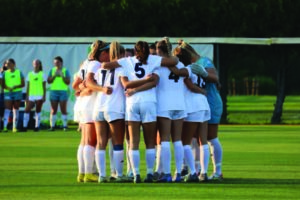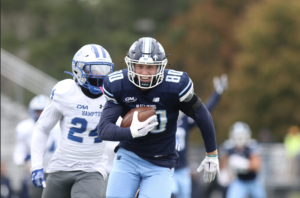Football may be one of the most beloved sports in the country, but there is a dark side to the NFL that has been affecting many teams in recent history. Over the last couple of years, multiple star players in the NFL have been accused or convicted of domestic violence or sexual assault. In the same amount of time, the NFL has done little to discipline the players that have perpetrated these actions.
In February, a video was released by TMZ that shows footage of Kareem Hunt, running back for the Kansas City Chiefs, assaulting a woman at a hotel in Cleveland. Hunt has since been released by the Chiefs, but many are calling on the NFL to enforce stronger repercussions for athletes who have been implicated in assault charges, especially charges of assault against women.
Reportedly, when the NFL sat down with Hunt in the fall of 2018, the investigators avoided talking about Hunt’s assault of the woman, and instead asked him about an altercation with a man in June, whom Hunt had allegedly punched in the face.
Even this alleged assault did not result in discipline from the NFL. The recent lack of discipline has called the case of former Baltimore Ravens running back Ray Rice back into discussion. When Rice was caught on video punching his fiancee in a hotel elevator, the league was bashed heavily for its lack of depth into the investigation.
Former FBI Director Robert Mueller was tapped by the NFL to investigate how the Rice investigation was being handled. Mueller had written in the report that “the NFL should have done more with the information it had, and should have taken additional steps to obtain all available information.”
During the time of Rice, the NFL came under fire for their relaxed view on what was considered a punishment for the running back; Rice was only issued a two-game suspension. NFL Commissioner Roger Goodell originally defended the length of Rice’s suspension, but then went on to implement league-wide policies regarding sexual assault and domestic violence.
These new policies indicated that a player involved in sexual assault or domestic violence incidents will receive a six-game suspension for their first offense, and a ‘theoretical’ lifetime ban from the NFL for a second offense. However, these policies leave it unclear what has changed in relation to player’s consequences. Goodell classified the new policies under the NFL’s Personal Conduct Policy, and he had the authority to give Rice a longer suspension if he had chosen to. Goodell had doled out a six-game suspension to Ben Roethlisberger, quarterback for the Pittsburgh Steelers, in 2010, who was accused of sexual assault by a 20-year-old college student, which proves that this could have been a repercussion in Rice’s case as well.
The case of New York Giants kicker Josh Brown shows just how the policy worked. Brown was arrested on a misdemeanor domestic violence charge in May 2015, and subsequently was only suspended for one game in August 2016. The case was revisited two months later because police documents held Brown’s admission to abusing his wife. Brown was placed on paid leave and removed from the Giants’ roster. However, he only faced a six-game suspension in September of that year.
Looking at how the Chiefs and the NFL handled Hunt’s incident, very little was done to investigate. The Chiefs had acknowledged that they knew about the incident since around the time that it had occurred and did very little to address the issue. The NFL acknowledged that they had not obtained the video that had surfaced on TMZ but knew about the attack. They had not acted to investigate further since the video was released in February and the incident Hunt was involved in during June.
By having a relaxed approach to domestic violence, the NFL advertises that they care more about the image of dealing with sexual assault scandals, rather than dealing with the root causes of domestic violence amongst the players that represent the NFL.
In June of 2018, Deborah Epstein, the Domestic Violence Expert in the NFL, resigned. She had previously worked to conduct studies of player’s wives to collect suggestions for handling domestic violence. She told NPR that her decision to resign was made for her after she noticed a troubling pattern emerge during her communications with the NFL Players Association.
“I brought a number of ideas to the commission about ways in which they could deal with the domestic violence problem in the NFL,” Epstein told NPR. “The Player’s Association contacts that I [had] would welcome those ideas, tell me they were eminently doable, but that they had to get kicked down the road because ‘It was the Super Bowl, it was the draft, it was the season,’ and I would come back and reiterate my suggestions, and eventually I found that communication would just die on the vine.”
The NFL is effectively ending many attempts to bring attention to domestic violence within the league, allowing this behavior to continue in a vicious cycle.











